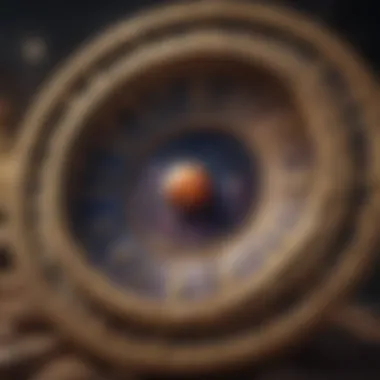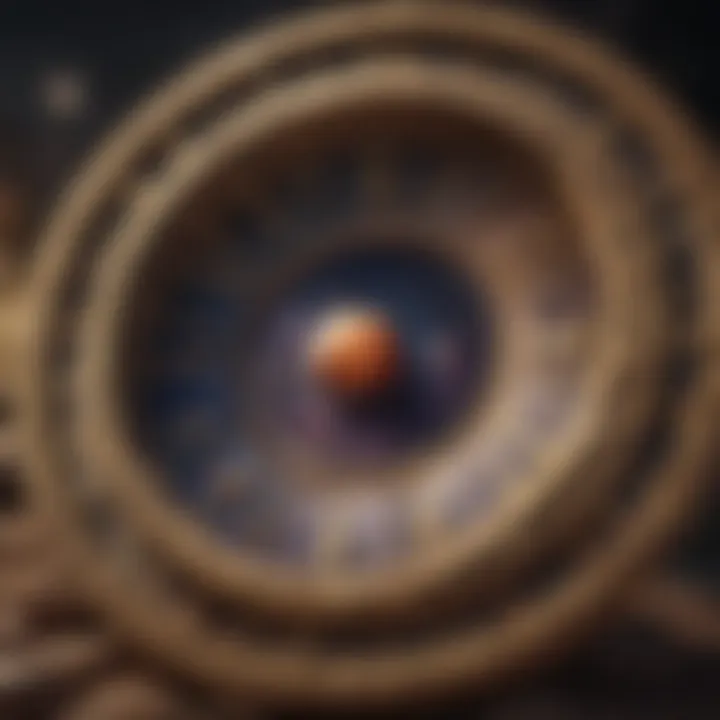Astrology: The Crucial Role of Birth Date and Time in Horoscope Analysis


Intro
Astrology serves as an intricate matrix of cosmic influences, weaving the celestial with the personal. Understanding the critical role of birth date and time can profoundly enhance horoscope interpretations. As astrology evolves, its foundation remains rooted in the specific details surrounding an individual's entrance into the world. The cosmos, at that precise moment, paints a unique picture of potentiality that can guide one’s path. The importance of this exact timing cannot be understated, allowing for a tailored reading, reflecting not just general zodiac sign traits but also the nuances of planetary positions.
To fully grasp the relevance of birth details in horoscope interpretation, it is essential to explore the core astrological concepts. The interplay of celestial bodies at the moment of birth reveals much about individual strengths, weaknesses, and life directions. As we delve deeper into these facets, we will uncover how this framework enriches personal insights and influences various astrological interpretations today.
Understanding Astrology
Astrology serves as an intricate system of beliefs and practices that connects celestial phenomenon to human affairs. It offers frameworks to understand personality traits, predict events, and guide individuals in their lives. Each person's (natal) chart is a reflection of cosmic influences at the very moment they came into this world. Understanding astrology is paramount for anyone looking to deconstruct the influences on behavior and fate.
Definition and Origins of Astrology
Astrology can be defined as a field of study that examines the positions and movements of celestial bodies—such as planets, stars, and the moon—and interprets their relationships to human experiences. Its roots trace back over thousands of years to ancient civilizations, such as those in Mesopotamia, Egypt, and Greece. These societies viewed the heavens as not just a backdrop to life but an influential force governing events and individual characteristics.
One must consider how astrology evolved over time. Where the Babylonians first developed an astrological system based on the twelve zodiac signs, the Greeks added layers of complexity by integrating philosophical ideas and mathematical models. This blending of cultures led to richer interpretations, establishing astrology as a formal practice with dedicated scholars and practitioners.
"Astrology offers a unique lens into the interplay of the universe and individual experience, enabling insights that might otherwise remain obscured."
The Structure of Astrological Charts
The astrological chart, often referred to as a natal chart or birth chart, is a map of the heavens at a given time and place. It provides a snapshot of the positions of celestial bodies relative to Earth. This structure is fundamental in interpreting one's horoscope and holds multiple components like the sun, moon, planets, and specific points such as the Ascendant.
Astrological charts are organized in a circular format divided into twelve segments, known as houses, each governing different aspects of human life. The layout of these houses is determined by the individual's birth time and geographic location, thus reinforcing the significance of the exact moment of birth in astrology. Understanding how to read these charts involves grasping the connections and aspects between these celestial elements, as each offers unique influences and insights.
Importance of Birth Date and Time
In astrology, the birth date and time are not mere numbers; they form the foundation of a person’s horoscope. Understanding their importance can lead to deeper individual insights. A precise astrological interpretation hinges on both these elements, influencing everything from personality traits to life paths.
How Date Influences Zodiac Sign
The date of birth determines the position of the Sun in the zodiac at the moment of birth. Each zodiac sign represents specific characteristics and tendencies. For example, someone born on April 15 falls under Aries, a sign associated with leadership and spontaneity.
This correlation is crucial because when astrologers refer to someone's zodiac sign, they refer to the Sun sign, which resonates at a core level. The connection between the birth date and the Sun's position affects the interpretation of a person's essential traits and inclinations.
In addition to the Sun sign, the date can also offer insights into relationship dynamics. Different signs interact in unique ways. Thus, knowing one's zodiac sign can assist in understanding compatibility with others.
Role of Time in Astrological Accuracy
While the birth date establishes the Sun sign, the exact time of birth impacts the entire astrological chart's precision. The time specifies the positions of the Moon, planets, and other celestial bodies. Astrologers rely on these positions to form a comprehensive natal chart, which includes aspects like the Moon sign and houses.
An accurate time of birth enhances the chart's reliability. Minor adjustments in time can drastically change the planetary alignments. Thus, even a difference of a few minutes can shift the rising sign, which in turn affects the interpretation of traits and life events significantly. It is why new parents are often advised to remark the time of birth accurately.
Defining the Ascendant
The Ascendant, or rising sign, is one of the most significant components of an astrological chart. It reflects how an individual presents themselves to the world. Understanding the Ascendant offers insights about outward behavior and life approach.
The Ascendant is determined by the exact time and location of birth. It symbolizes first impressions and personal style. If someone has a Leo Ascendant but is a Cancer Sun, they might exhibit confidence, making them appear outgoing despite their underlying sensitivity. Knowing the Ascendant can create a layered understanding of an individual, combining internal motives with external expressions.
Components of a Horoscope


Understanding the components of a horoscope is vital for anyone engaged in astrology. A horoscope offers a snapshot of the celestial positions when a person is born, influencing their personality and life path. It combines various elements, such as zodiac signs, planetary positions, and houses, to create a unique representation of one’s potential and challenges. Each component plays a role in translating cosmic influences into meaningful insights.
The Twelve Zodiac Signs
The zodiac signs form the foundation of astrological interpretation. Each sign represents distinct traits and characteristics which people exhibit based on their birth dates. Aries is known for its passionate nature, while Taurus showcases traits of stability and determination. Understanding these signs not only helps in personal development but also in social interactions.
The signs can be categorized into four elements: Fire, Earth, Air, and Water. Each of these elements has three associated signs. For example, Leo, Aries, and Sagittarius belong to the Fire element, indicating boldness and enthusiasm. In contrast, Capricorn, Virgo, and Taurus embody traits of Earth, suggesting practicality and reliability. This classification provides insight into the innate tendencies individuals may exhibit, based on their sun sign.
Planets and Their Movements
Planets carry specific energies that influence various aspects of life. In astrology, each planet represents different facets of personality and experiences. For instance, Venus governs love and relationships, while Mercury influences communication and intellect. The position and movement of these planets at the time of birth shed light on how a person interacts with these vital areas.
The movement of planets through the heavens is also important in astrology. As planets transit through different signs and houses, they impact one's life experiences. For example, when Jupiter moves into a new house, it can signify growth and opportunity in that area of life. Understanding these movements helps astrologers and individuals grasp the changing dynamics of their lives.
Houses and Their Significance
The astrological houses represent different life areas, such as career, relationships, and personal growth. Each house corresponds to various elements of existence, influencing how individuals experience life. For instance, the first house, also known as the Ascendant, is about self-image and personal identity. The seventh house deals with partnerships and marriage.
The significance of houses is amplified by the signs and planets that occupy them. For example, having Mars in the tenth house could indicate a dynamic and ambitious career path. Thus, understanding how houses work in conjunction with zodiac signs and planetary positions provides deeper insights into the individual’s life path and purpose.
In summary, each component of a horoscope works synergistically to inform one’s personality, relationships, and life challenges. Recognizing the interplay between the zodiac signs, planets, and houses enriches astrological understanding, leading to personalized insights and guidance.
Astrological Calculations
Astrological calculations are crucial for interpreting a horoscope accurately. These calculations involve various components that form the basis of an astrological chart. The significance of determining precise positions of celestial bodies at the exact moment of birth cannot be overstated. When one understands the intricacies of these calculations, it is possible to gain deep insights into one's personality, potential, and life events.
Key aspects of astrological calculations include the natal chart, planetary aspects, and the understanding of transits and progressions. Each element serves to enhance the analysis of an individual’s astrological influence. Understanding these allows astrologers to make more personalized predictions and provide more relevant guidance to their clients.
Calculating the Natal Chart
A natal chart is the foundation of astrology, mapping the positions of planets at the time of birth. To calculate it, one must know the specific date, time, and location of birth. This information allows astrologers to determine the angles between planets and the twelve houses.
The process includes:
- Gathering necessary data: Accurate birth date, exact time, and geographic location are essential.
- Using astrological software: Tools like Astrodienst or AstroSeek can simplify complex calculations.
- Visualizing the chart: This chart illustrates the celestial positions in relation to Earth at the birth moment.
The resultant natal chart reveals much about an individual’s potential. It serves as a guide for personal growth and helps in identifying periods of opportunity or challenge in one's life journey.
Interpreting Planetary Aspects
Planetary aspects refer to the angles formed between planets in the natal chart. Understanding these aspects is key to revealing how different celestial influences interact with one another. Some aspects are harmonious, while others may represent tension. The main aspects include:
- Conjunction: When two planets align, their energies blend.
- Trine: A supportive relationship between planets that fosters ease and advantage.
- Square: A challenge that may necessitate overcoming obstacles.
Effectively interpreting these aspects can illuminate the complexity of an individual's personality. Skilled astrologers analyze these interactions to better understand various traits, tendencies, and potential life paths.
Understanding Transits and Progressions
Transits and progressions are essential for forecasting future events and personal developments. Transits involve the current movements of planets in relation to the natal chart. This analysis sheds light on changes in an individual’s circumstances.
For example, when Saturn transits a person's natal sun, it may signify a period of discipline and responsibility. Understanding these movements helps in:


- Anticipating challenges: By recognizing patterns, one can prepare for potential hurdles.
- Timing decisions: Knowing auspicious times for important choices or actions can enhance outcomes.
Progressions, on the other hand, allow astrologers to predict internal changes over time by moving the natal chart forward. This technique gives insight into personal evolution, making both transits and progressions vital for a comprehensive astrological analysis.
"Astrological calculations not only serve to elucidate personal attributes but also function as a forecasting tool for life events and challenges. When applied thoughtfully, they can enhance decision-making and personal growth."
Practical Applications of Astrology
Astrology transcends the mere scholarly pursuit of celestial bodies. It integrates itself into daily life, affecting personal insights and decision making. Understanding the practical applications of astrology is crucial as it sheds light on how individuals can harness astrological knowledge to navigate life's complexities.
Personal Insights and Decision Making
Astrology provides a lens through which individuals may reflect on their personal experiences. By analyzing one's natal chart, people can gain clarity about their strengths, weaknesses, and potential life paths. This self-exploration is not just about uncovering one’s zodiac sign but rather involves understanding how different planetary positions at the time of birth influence traits and tendencies. For instance, if someone has Mars in Scorpio, they may exhibit intensity and passion. Recognizing such traits can empower individuals to make informed decisions aligned with their inherent tendencies.
Furthermore, astrology serves as a guide during critical decision-making moments. It allows one to weigh out the cosmic influences at play during upcoming periods. For example, if an important life event is coming up, one might consult the transits to determine which timing is favorable. Special attention to significant astrological events, like eclipses or retrogrades, can aid individuals in making choices that are more in sync with their personal journey.
Compatibility Analysis
Understanding compatibility through astrology is another practical application that many individuals find valuable. This analysis extends beyond romantic relationships and can also apply to friendships and professional partnerships. By comparing the natal charts of individuals, astrologers can identify harmonious connections and potential challenges.
For example, the comparison of the Sun, Moon, and Venus placements reveals inherent emotional and romantic compatibility factors. If two people’s moons are in compatible signs, they may share a deeper understanding of emotional needs. On the other hand, analyzing the aspects between two charts may reveal friction points that either party should be mindful of. This awareness allows individuals to approach relationships with a better strategy and foster healthier bonds.
Astrology in Modern Context
Astrology has seen a resurgence in recent years, especially among younger generations. Its integration into modern life is an intriguing evolution. Today, astrology is accessible in various formats, including apps, social media platforms, and podcasts. These innovations have democratized astrological knowledge, allowing more people to engage with it.
However, it is crucial to approach modern astrology with discernment. Not all astrological interpretations are equally valid or profound. Individuals interested in astrology should seek out knowledgeable practitioners who value accuracy and ethical considerations in their readings. Balancing traditional astrological wisdom with modern interpretations ensures that individuals derive genuine insight rather than simplistic affirmations.
"Astrology can offer rich insights that support personal growth, yet requires a discerning approach to practical application."
In summary, practical applications of astrology are manifold—from personal insights and decision making to the exploration of compatibility. As astrology continues to evolve, its integration into modern life highlights its relevance and potential for personal development.
Challenges and Critiques of Astrology
Astrology is surrounded by much debate. It is important to understand that the practice has faced several challenges and critiques over time. This section explores the nature of these issues as they pertain to astrology's validity and relevance. By examining both scientific and ethical perspectives, readers can gain deeper insight into criticism against this ancient practice.
Scientific Perspectives
One of the primary critiques of astrology comes from the scientific community. Many scientists argue that astrology lacks empirical evidence. Numerous studies have been conducted to test astrological predictions, but results typically show no correlation between astrological charts and real-life outcomes.
A common argument centers around the laws of physics and biology. Astrologers claim celestial bodies influence human behavior. However, critics posits that such assertions defy established scientific principles. The observed gravitational effects of planets are minuscule at best, often dismissed as insignificant by researchers. Moreover, the methods used in astrology—like vague and broad predictions—can lead to confirmation bias. People tend to remember specific instances where predictions were accurate while ignoring cases where they failed.
Despite criticism, many practitioners still defend astrology, believing its insights have psychological merit, even if not scientifically validated. This ongoing debate highlights a clear division between empirical science and the intuitive nature of astrology.
Ethical Considerations in Astrology
Alongside scientific skepticism, ethical concerns arise within the astrological field. One significant issue is the potential for manipulation. Astrological insights can influence personal decisions, from career choices to relationships. If misused, they can lead individuals to make poor life choices based on assumptions that lack strong backing.
Additionally, there is concern about the implications of fatalism in astrology. Some people may interpret astrological readings as definitive outcomes, leading them to relinquish personal agency. This deterministic outlook can create a mindset where individuals fail to take responsibility for their actions, believing that their fate is solely dictated by celestial movements.


Astrologers have a responsibility to convey information ethically and transparently. This means clarifying the nature of astrology and its limitations. Providing clients with a realistic view of how astrology can aid in personal growth without making absolute predictions is essential.
In order to promote responsible practice, some ethical guidelines have emerged within the astrology community. These could include:
- Transparent Communication: Be clear about the uncertainties and subjectivity of astrological interpretations.
- Encouraging Personal Agency: Remind clients that they possess power to make choices independent of astrological insights.
- Respecting Privacy: Maintain confidentiality when dealing with clients' personal information.
By addressing both scientific critiques and ethical implications, astrology can strive for a more responsible and comprehensive practice that fosters respect and understanding among practitioners and clients alike.
The Future of Astrology
The evolving landscape of astrology is drawing attention. The intersection of traditional practices and modern sensibilities creates a unique space in which astrology can flourish. This section explores the importance of envisioning the future of astrology, focusing on how emerging trends and technological advancements are reshaping the field. Understanding these changes presents both opportunities and considerations for astrologers and enthusiasts alike.
Emerging Trends in Astrological Practice
In recent years, several trends have emerged in astrological practice that reflect a shift in how astrology is approached. First, there is a noticeable movement towards personalized astrology readings. People seek more tailored insights that resonate with their unique life experiences. This shift encourages the use of individual birth charts over general sun sign readings.
Additionally, there is an increased demand for astrological community engagement. Many practitioners are creating platforms for discussions, workshops, and seminars. This trend reflects a broader desire for connection among those interested in astrology. Engaging with others in this field enhances learning opportunities and allows practitioners to share diverse perspectives.
- Increased focus on personal readings
- Greater community engagement in astrology
- Exploration of new methodologies and techniques
These developments show that astrology is adapting to the needs of its audience. The growing emphasis on inclusivity and shared learning helps dismantle some historical mystique surrounding the practice.
Technological Influence on Astrology
Technology is playing a significant role in shaping the future of astrology. Digital tools are making it easier for individuals to access astrological information. Online platforms and mobile applications allow users to generate natal charts and gain insights at their fingertips. This convenience is fostering a wider acceptance of astrology.
Furthermore, advancements in data analytics are enabling astrologers to offer more precise readings. By integrating vast amounts of astrological data and trends, practitioners can deliver comprehensive analyses that were not possible before.
- Availability of apps for personal astrology
- Enhanced data-driven insights in readings
- Online platforms fostering community interaction
"As technology continues to grow, astrology must embrace new tools while staying true to its core principles of self-discovery and guidance."
Ultimately, the future of astrology hinges on its ability to adapt. Whether through personalized readings or technology, the goal remains to provide valuable insights into individual lives. These shifts present both challenges and opportunities for astrologers as they navigate this evolving terrain.
Finale
Understanding the significance of birth date and time in horoscope interpretation is essential for anyone interested in astrology. The conclusion serves to highlight the interconnectedness of astrological principles and their practical applications. These principles impact personal insight, decision making, and self-awareness. By acknowledging how complex cosmic forces shape individual destinies, one gains a deeper appreciation of astrology.
In this article, we explored several key themes. We clarified how the precise time and date of birth influence zodiac sign determination, ascendant characteristics, and planetary positions in natal charts. The discussions elucidated the multidimensional nature of horoscopes, stressing that each component plays a vital role.
The benefits of integrating this knowledge into personal exploration are manifold. Astrological interpretations offer guidance on significant life choices, enhance emotional intelligence, and foster interpersonal relationships. Considerations about how to effectively apply astrological insights extend not only to personal growth but also to broader societal contexts.
"Astrology bridges the gap between personal experience and universal patterns, allowing individuals to navigate the complexities of life more adeptly."
Reflection on Personal Journey through Astrology
Each astrological journey begins with self-reflection, often ignited by awareness of the forces at play in one's life. Individuals are invited to contemplate their own experiences. Think about how moments of synchronicity influenced choices or prompted introspection. The journey reveals both outer experiences and inner landscapes shaped by celestial configurations. Individuals often realize that astrology can serve as a mirror, reflecting personal growth and shifts in understanding.
A personal horoscope unveils the layers of self, including strengths, weaknesses, and hidden potentials. This ongoing exploration encourages a deeper connection to oneself and fosters a sense of belonging in the greater cosmos. Recognizing this dynamic allows individuals to harness their astrological insights, leading to richer, more authentic lives.
Encouragement for Continuous Exploration
In any field of knowledge, curiosity breeds growth. Astrology, with its vastness, offers an endless avenue for exploration. Those intrigued by this cosmic science are encouraged to delve deeper into various aspects of their natal charts and astrological events. There is much to uncover, from planetary transits to progressions and beyond.
Continuous exploration helps in understanding how repetitive patterns in life connect to astrological cycles and can illuminate future paths. Engaging with texts, joining astrological communities, or even attending workshops can enhance one's knowledge.
Ultimately, the pursuit of astrological understanding can yield profound insights, enriching not only one's life but also the lives of those around them. The cosmos tells a story—a story that invites active participation. Enthusiasts should feel encouraged to follow the threads of this narrative, enhancing their journey through the stars.







